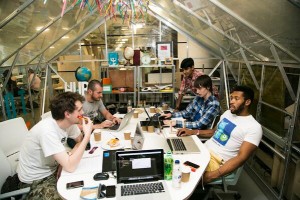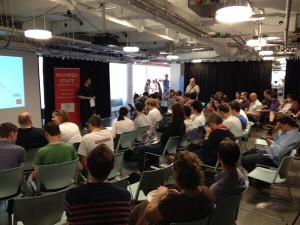Helen Bevan (@helenbevan on Twitter) is part of the delivery team for NHS Improving Quality, the national improvement team of the NHS in England.
I live in a world of healthcare improvement, quality and safety. I spend my hours working with others to build action for change and transformation and seeking to solve the eternal challenge of how to help change spread from one place to another.
Increasingly in my world, people are talking about “hack days” and “hackathons”. A number of the young NHS leaders and trainee doctors that I interact with take part in “NHS Hack Days”; the Management Innovation eXchange, is running global virtual hackathons to reinvent the way that organisational leaders lead change and across the world, governments are using hack day methods to create more transparent, accessible services for citizens. A hack day is essentially an event of one or more days where people involved in software development (known as “developers” or “devs”), subject matter experts and others get together to invent creative solutions or new insights to tricky problems. I can see from my world that leaders of change are starting to apply methods that originated in the software industry (and were about technical data-driven solutions) to solving big strategic issues such as strategic planning, community building, system redesign, and transformational leadership development.
So I thought I had better experience a hack day. When BMJ offered me the chance to be a judge at their hack on 6th and 7th July, I jumped at the opportunity to take part, observe and learn. The event started at 10am on Saturday morning and ended at 7pm on Sunday night. There were about 50 people taking part in the hack day, about two thirds of which were “devs”, many of whom had no or little health background. There were also medical students, academics and clinicians. They could choose from one of four challenges to work on. The first was around “digital medical students”, building innovative applications to help create future doctors. The second challenge was about creating a “zero harm NHS”. The third challenge was about contextualising knowledge content, such as BMJ Best Practice, to local settings around the world and the final challenge was about how to revolutionise the scholarly publication process, to enable greater collaboration and access.
So after the initial briefing, the participants started to share ideas, identify potential areas to work on, define their hacks and build teams. Some people had bought topics that they had already been working on for months, others offered their services as specialist contributors to teams. They were given access to BMJ data to work with. Over the next 24 hours, I observed the teams diagnosing problems, generating ideas, experimenting and prototyping their solutions. At first, I was surprised that some of the teams didn’t spend longer finding out about the context of the problems they were seeking to solve, by talking to the people who were present at the hack day who could give them a lot of information. Many of them dived straight into the data. What I realised after a while is that they used the data to understand the problem and the context. I was astonished at what they could do with data!
All of the developers were volunteers. They gave up their weekend to take part in the challenge. Many of them slept overnight at the venue and worked well into the night creating their solutions. There was a fantastic spirit and enthusiasm for the topics. At 4pm on Sunday, each of the 13 teams took part in a “show and tell” to present their solutions to the judges. There was a wide range of hacks, ranging from on-line calendars for clinical students in hospitals to a motion tracker to prevent patient falls and pressure ulcers to medical decision trees using basic mobile phones in locations where availability of technology is limited. In nearly every case, the presenter of the idea had actually built a computer application that they were physically able to demonstrate. They had done this in a period of a little over 24 hours. They challenged my pre-conceptions about what can be achieved in a short timescale.
You can read about the winners in the next copy of BMJ. There is also a blog from a member of the winning team. The winning entries tended to be those where developers and clinicians had formed teams together, combining specialist developer expertise with subject-matter expertise to tackle big problems in a context-specific way.
I benefitted so much from this experience. These are some of the learning points I took away:
- We need to engage lots of different change agents to tackle the challenges of health and care and get fresh eyes on the issues. This weekend I learnt a lot about change from 15 and 17 year old developers
- Open innovation (innovating in partnership with those outside of your organisation or usual collaborators) is a very powerful way to get new ideas and perspectives and we need to do more of it
- People will volunteer and give of themselves greatly if we set the challenges in an exciting way, engage with their values, support them to work with others for a shared purpose and value their contributions
- There is massive potential to build communities of learning and action, based on hack methods, to tackle some of our biggest challenges
- The best solutions come when we combine effective data analysis with creativity and imagination and human values and intuition
Thanks BMJ for inviting me to my first hack day. I hope it is the first of many.

